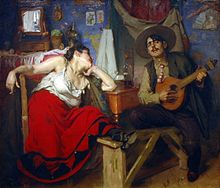
Back فادو Arabic Fadu AST Fadu Azerbaijani Фаду Bulgarian Fado Catalan Fado CBK-ZAM فادۆ CKB Fado Czech Fado Danish Fado German
| Fado | |
|---|---|
 Fado, painting by José Malhoa (1910) | |
| Stylistic origins | Portuguese music |
| Cultural origins | Early 19th-century Lisbon, Portugal |
| Derivative forms | Coimbra Fado |
| Fado, urban popular song of Portugal | |
|---|---|
| Country | Portugal |
| Domains | Performing arts |
| Reference | 00563 |
| Region | Europe and North America |
| Inscription history | |
| Inscription | 2011 (6th session) |
| List | Representative |
Fado (Portuguese pronunciation: [ˈfaðu]; "destiny, fate") is a music genre which can be traced to the 1820s in Lisbon, Portugal, but probably has much earlier origins. Fado historian and scholar Rui Vieira Nery states that "the only reliable information on the history of fado was orally transmitted and goes back to the 1820s and 1830s at best. But even that information was frequently modified within the generational transmission process that made it reach us today."[1]
Although the origins are difficult to trace, today fado is commonly regarded as simply a form of song which can be about anything, but must follow a certain traditional structure. In popular belief, fado is a form of music characterized by mournful tunes and lyrics, often about the sea or the life of the poor, and infused with a sense of resignation, fate and melancholy. This is loosely captured by the Portuguese word saudade, or longing, symbolizing a feeling of loss (a permanent, irreparable loss and its consequent lifelong damage). This is similar to the character of several musical genres in Portuguese ex-colonies such as morna from Cape Verde, which may be historically linked to fado in its earlier form and have retained its rhythmic heritage. This connection to the music of a historic Portuguese urban and maritime proletariat (sailors, bohemians, dock workers, prostitutes, taverna frequenters, port traders, fishwives and other working-class people) can also be found in Brazilian modinha and Indonesian kroncong, although all these music genres subsequently developed their own independent traditions.
Some famous singers of fado, of which there are many, include Alfredo Marceneiro, Amália Rodrigues, Carlos do Carmo, Mariza, António Zambujo, and Camané. On 27 November 2011, fado was added to the UNESCO Intangible Cultural Heritage Lists.[2] It is one of two Portuguese music traditions part of the lists, the other being Cante Alentejano.[3]
Modern fado is popular in Portugal, and has been performed by many renowned musicians.
- ^ "Para uma História do Fado, Rui Vieira Nery, NERY, RUI VIEIRA, Livros. Comprar livro na Fnac.pt". Archived from the original on 2012-04-05. Retrieved 2011-11-29.
- ^ "Fado, urban popular song of Portugal". UNESCO Culture Sector. Retrieved 2011-11-27.
- ^ "Cante Alentejano, polyphonic singing from Alentejo, southern Portugal". unesco.org. UNESCO. Retrieved November 3, 2015.
© MMXXIII Rich X Search. We shall prevail. All rights reserved. Rich X Search